By Emma Lezberg
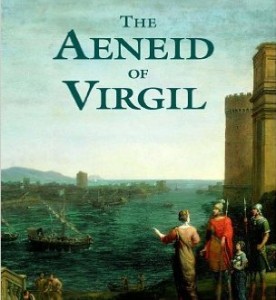 Fifth century grammarian Tiberius Claudius Donatus didn’t think highly of his son’s teachers. These instructors, he complained, were barely scratching the surface of the most eminent of Roman classics: Vergil’s Aeneid, the epic poem that chronicles the events leading up to Rome’s founding. So Donatus set out to write the commentary Interpretationes Vergilianae, attempting to prove that every line in the poem praises the emperor Augustus. Aeneas, the epic’s hero, was widely interpreted as the literary embodiment of Augustus. As long as the poem spoke only highly of Aeneas, Donatus’s task would be easy.
Fifth century grammarian Tiberius Claudius Donatus didn’t think highly of his son’s teachers. These instructors, he complained, were barely scratching the surface of the most eminent of Roman classics: Vergil’s Aeneid, the epic poem that chronicles the events leading up to Rome’s founding. So Donatus set out to write the commentary Interpretationes Vergilianae, attempting to prove that every line in the poem praises the emperor Augustus. Aeneas, the epic’s hero, was widely interpreted as the literary embodiment of Augustus. As long as the poem spoke only highly of Aeneas, Donatus’s task would be easy.
Not everything in the epic, however, seems to praise Aeneas. Aeneas climbs a crag? That’s praising his physical fitness. Aeneas seduces a widowed queen? That’s praising his looks and charm. But what about when Aeneas meets his mother Venus, disguised as a huntress, and doesn’t recognize her? “Well, he doesn’t rape her” is the best Donatus can come up with (Starr 164-165).
Donatus’s assertion that everything in the Aeneid praises Aeneas—and, by extension, Augustus—results in a “flattening” of the poem (173). His theory does not allow him to accept the most textually supported interpretations, and it blinds him to many fascinating aspects of the epic. For example, Aeneas’s seduction of the queen may not actually praise our hero, and interesting implications arise if we acknowledge that possibility. Otherwise, this narrowed view forces the commentator to read only “to find an answer he already knows, not an answer he has yet to discover” (162). Instead of reshaping the poem to align with some presumed intent, scholars should allow the epic to sing for itself. For the Aeneid, they will find a poem that does not portray Aeneas and Augustus as perfect, but questions the morality of empire and the divinity of Rome’s leaders.
Donatus was correct about at least one thing: most scholars agree that Aeneas should be read as the literary embodiment of Augustus. Aeneas founded Rome; Augustus was attempting to re-found it. Both Aeneas and Augustus are referred to as “son of a God”, and Augustus is portrayed as a direct descendant of Aeneas. Every other well-known writer in Augustan Rome (e.g. Horace, Livy, Ovid) also used mythological characters as representations for the emperor. There is good reason, then, to entertain the possibility that Aeneas represents Augustus. What many modern scholars do not agree with, however, is that either is portrayed as faultless. Analyzing the poem without presuming intent allows a reader to notice some peculiarities.
First, the demigod Aeneas is not the perfect hero. He breaks down and loses control at times; he remains utterly insensitive at others; he is not always quick to recognize the causes of events unfolding around him; and he does not live up to his epithet pius Aeneas (“dutiful Aeneas”). Second, the epic depicts Aeneas’s antagonists as worthy of praise and sympathy, more victims than villains. Third, it lauds the contemporary foes of Rome more sincerely than its statesmen. Let’s start with Aeneas’s shortcomings and work our way down the list.
We first meet Aeneas in a moment of crisis. As captain of a ship, he finds himself in a severe storm, and “all things threaten instant death to the men” (I. 91). Our hero responds in a notably non-heroic way:
At once the limbs of Aeneas are relaxed [go limp] with cold; he groans, and, stretching both palms to the stars, says with such a voice: “Oh three and four times blessed, those who chanced to die before the faces of their fathers beneath the high walls of Troy! O Diomedes, bravest of the race of Danaeans! Could I not have fallen on the Trojan plains and poured out this spirit by your right hand, where savage Hector lies by the weapon of Achilles, where huge Sarpedon lies, where so many shields and helmets are snatched up under the waves by the Samois, and brave bodies roll?” (I. 92-101).
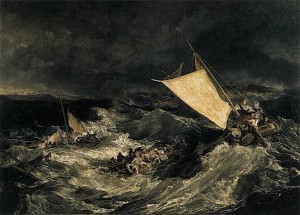 Donatus had asserted that Aeneas was semi-divine and thus “devoid of every fault,” unaffected by the fears and urges of mere mortals (Starr 161). That is not the man we are meeting in this passage. He is not taking pains to reassure his men or lead by example. Instead, he sounds how we humans might feel in such a situation: thoroughly terrified. Aeneas even admits this himself, contrasting the bravery of the soldiers at Troy with his own cowardly comportment in what he thinks will be his last moments. His “woe is me” lament humanizes him, which is exactly what Donatus is combatting; rejecting Aeneas’s measure of divinity exposes him to potential criticism as the epic progresses. Skeptics might point out that Aeneas soon regains control of himself and delivers an encouraging speech to his men, “pretending[ing] hope with his features and push[ing] down the pain deep in his heart” but he does so only after they have safely landed (I. 209). During the most calamitous moments, he is just as paralyzed as most people would be.
Donatus had asserted that Aeneas was semi-divine and thus “devoid of every fault,” unaffected by the fears and urges of mere mortals (Starr 161). That is not the man we are meeting in this passage. He is not taking pains to reassure his men or lead by example. Instead, he sounds how we humans might feel in such a situation: thoroughly terrified. Aeneas even admits this himself, contrasting the bravery of the soldiers at Troy with his own cowardly comportment in what he thinks will be his last moments. His “woe is me” lament humanizes him, which is exactly what Donatus is combatting; rejecting Aeneas’s measure of divinity exposes him to potential criticism as the epic progresses. Skeptics might point out that Aeneas soon regains control of himself and delivers an encouraging speech to his men, “pretending[ing] hope with his features and push[ing] down the pain deep in his heart” but he does so only after they have safely landed (I. 209). During the most calamitous moments, he is just as paralyzed as most people would be.
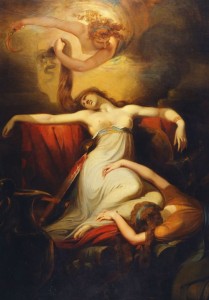 While his bravery disappoints in this case, at other times his judgement and perception are what fail him. When Aeneas escapes the storm and lands in Carthage, he seduces the Carthaginian queen Dido and moves into the palace with her; she believes they are married. Then the gods order him to continue his journey. Aeneas handles the situation terribly, initially hiding his departure from Dido and then justifying himself with the impersonal argument, “It is right for us too to search out a foreign kingdom” (IV. 50). She, despairing, asks him point-blank, “Does my love not hold you, nor my pledge I once gave you, nor the promise that Dido will die a cruel death?” (IV. 307-308, emphasis added). Later, when Aeneas meets her in the Underworld after she has committed suicide, he has the audacity to say, “Alas, was I the cause of your dying?… I did not think my leaving there would ever bring such grief to you” (VI. 457, 462-463). He is either lying through his teeth or had truly been an imperceptive fool. Then, while back on the open ocean, personified Sleep bewitches his helmsman Palinurus and throws him overboard. When Aeneas realizes his helmsman has been lost, he laments, “Oh, far too trusting of the calm sea, and the sky, you’ll lie naked, Palinurus, on an unknown shore” (V. 870-871). Once again, Aeneas has completely misread the situation. His friend had not trusted the sea; he had resisted Sleep, saying, “Do you tell me to trust the sea’s placid face…I whom a clear sky has deceived so often?” (V. 48, 51). Aeneas knows that the gods have been harassing his crew throughout the journey; why, then, is he so quick to blame his helmsman?
While his bravery disappoints in this case, at other times his judgement and perception are what fail him. When Aeneas escapes the storm and lands in Carthage, he seduces the Carthaginian queen Dido and moves into the palace with her; she believes they are married. Then the gods order him to continue his journey. Aeneas handles the situation terribly, initially hiding his departure from Dido and then justifying himself with the impersonal argument, “It is right for us too to search out a foreign kingdom” (IV. 50). She, despairing, asks him point-blank, “Does my love not hold you, nor my pledge I once gave you, nor the promise that Dido will die a cruel death?” (IV. 307-308, emphasis added). Later, when Aeneas meets her in the Underworld after she has committed suicide, he has the audacity to say, “Alas, was I the cause of your dying?… I did not think my leaving there would ever bring such grief to you” (VI. 457, 462-463). He is either lying through his teeth or had truly been an imperceptive fool. Then, while back on the open ocean, personified Sleep bewitches his helmsman Palinurus and throws him overboard. When Aeneas realizes his helmsman has been lost, he laments, “Oh, far too trusting of the calm sea, and the sky, you’ll lie naked, Palinurus, on an unknown shore” (V. 870-871). Once again, Aeneas has completely misread the situation. His friend had not trusted the sea; he had resisted Sleep, saying, “Do you tell me to trust the sea’s placid face…I whom a clear sky has deceived so often?” (V. 48, 51). Aeneas knows that the gods have been harassing his crew throughout the journey; why, then, is he so quick to blame his helmsman?
The most telling of Aeneas’s failings, of course, comes at the very end of the epic—we’ll get to that soon enough. First, let us put aside our hero for a moment and delve into the antagonists.
While Aeneas at times appears cowardly, unfeeling, or imperceptive, his antagonists are surprisingly sympathetic. His main foe is Turnus, a young warrior from Latium who had been betrothed to the maiden Aeneas is now to marry. Turnus—described as “most handsome” and “of powerful ancestry”—has been cheated out of this marriage through no fault of his own (VII. 56). When he rallies his troops against Aeneas, it is not of his own free will but because of divine meddling. “Brave Turnus,” as is his oft-repeated epithet, leads his men into battle and has earned their respect; his “confidence never wavered,” and his impressive routing of the Trojans is described in detail (IX. 126). His rousing speeches are just as well-crafted and eloquent as Aeneas’s (IX. 123-158; X. 276-282; cf. I. 198-207). Turnus’s one moment of hubris comes when he kills a young warrior named Pallas and steals his engraved belt, but it is not as if Aeneas too doesn’t have his frenzied moments in battle. Besides, Aeneas had promised Pallas’s father that he would protect him from such a fate. To end the bloodshed, Turnus eventually proposes single combat with Aeneas, and it is fate that decides the victor rather than any failing of Turnus’s. At worst, Turnus is a slightly arrogant warrior who picked the wrong fight; at best, he’s a courageous man unjustly robbed of his bride and his people by a cruel divine agreement.
Queen Dido is an even more sympathetic character. The queen is not only “most beautiful in form” but also an excellent leader, “assigning the labor of works in equal parts” among her citizens, “pressing on for the work for the future kingdom” (I. 496; 503-508). She is chaste, having been faithful to her late husband for years. Her relationship with her sister Anna is touching. And she does not fall in love with Aeneas of her own accord but is enchanted by Cupid, thus absolving her from any blame for her irrational actions. A modest shift could have easily spun this into a panegyric of Aeneas: simply portray Dido as another Circes, an attractive but deceptive witch. Instead, “Dido quickly emerges from the role of a temptress designed as a last snare to trap the hero, and becomes a woman who reveals human laws paramount even to divine ordinance” (Frank 182). Dido’s case is compelling and Aeneas’s decision to leave her cruel, even if it stems from divine command.
Here a potential counterpoint must be refuted:
Many modern critics have felt that Virgil’s sympathy for losing sides is so great that it obscures the main issue. So nobly, it is said, are Dido and Turnus portrayed, that the character of Aeneas is insipid in comparison: Dido and Turnus are human, but Aeneas is only the servant of Fate. This is a modern point of view, and it ignores a very different attitude in Virgil’s own day. Aeneas represents the Stoic ideal…of the man who presses on regardless (Grant, 196).
This would be a valid point if Stoicism, a school of philosophy that promoted indifference to pleasure and pain, were the only prominent school in Rome. Just as prominent at the time, however, was Epicureanism, which extolled pleasure as the ultimate good. The Aeneid is “full of Epicurean phrases and notions,” including reminiscences of the Epicurean Lucretius, and Stoic sentiments are few and far between (Frank, 183). One telling example of an Epicurean thread is the representation of the Gods and Fate in the poem. Stoicism requires that Jupiter be equivalent with Fate, whereas Epicureanism dictates that the gods be subordinated to it. The latter is clearly the Aeneid’s interpretation: the gods (Juno, Venus, even Jupiter) are constantly plotting to bend Fate and are frustrated by their inability to do so. The epic’s preference for Epicureanism suggests that Aeneas’s coldness is to be viewed not as a virtue, as Stoicism would see it, but as a vice.
If the text were justifying Aeneas’s actions—and by extension, Augustus’s—as necessary for founding an empire, why make Aeneas anything less than the model hero, and why make the two characters who oppose Aeneas, the two to whom he does the most harm, so sympathetic? The poem’s portrayal of Aeneas’s enemies as victims questions whether Rome’s leadership is really as faultless as it would have its citizens believe, and whether the Roman Empire should really be bought at such a price.
Which brings us, finally, to the end of the epic. When Aeneas is in the Underworld, he receives advice from his father’s shade. In a moment of gravity, his father tells him, “You, Roman, remember to rule the people with power (these will be your arts), to establish the tradition of peace, to spare the defeated, and subdue the proud” (VI. 851-853). Aeneas, the one who carried his father on his shoulders out of burning Troy, is pius Aeneas, loyal to his family and respectful of his elders. It is expected that he will take his father’s advice to heart: teach the arrogant a lesson while also showing restraint.
He leaves the Underworld, however, not through the gate of horn but through the gleaming ivory gate, by which the Shades “send false dreams to the upper world” (VI. 896). Some commentators take this to mean that Aeneas’s dream of a glorious Roman empire, or perhaps all of Aeneas’s actions, are somehow “false” as well.
In the last scene of the epic, Aeneas has defeated Turnus and has him prostrate on the ground, begging for mercy:
[Turnus] lowered his eyes in submission and stretched out his right hand: “I have earned this, I ask no mercy,” he said, “seize your chance. If any concern for a parent’s grief can touch you (you too had such a father, in Anchises), I beg you to pity Daunus’ old age and return me, or if you prefer it my body robbed of life, to my people. You are the victor, and the Ausonians have seen me stretch out my hands in defeat: Lavinia is your wife, don’t extend your hatred further” (XII. 930-938).
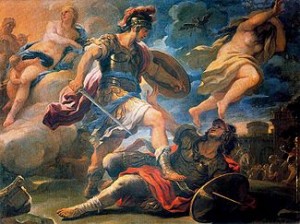 The text even mentioned Anchises, as if to remind Aeneas of his father’s former advice. Turnus has lowered his eyes “in submission” and stretched out his hands “in defeat”: he is the epitome of a conquered, humbled man. Aeneas, however, does not spare the defeated. He notices his friend Pallas’s belt on Turnus’s waist, and, “blazing with fury,” stabs him to death (XII. 946).
The text even mentioned Anchises, as if to remind Aeneas of his father’s former advice. Turnus has lowered his eyes “in submission” and stretched out his hands “in defeat”: he is the epitome of a conquered, humbled man. Aeneas, however, does not spare the defeated. He notices his friend Pallas’s belt on Turnus’s waist, and, “blazing with fury,” stabs him to death (XII. 946).
This is not pietas, the sense of duty the hero’s epithet had promised. This is the exact opposite: furor, unrestrained violence. Pius Aeneas, it turns out, cannot control himself, a realization incompatible with Donatus’s depiction of a perfect Roman leader. Rather than portraying Aeneas as flawless, an assumption clearly not supported in the text, the poem is suggesting that power has eroded his moral foundations, resulting in great human suffering. Once that has been established, it doesn’t take a great leap to suggest that Rome itself, and Rome’s current leader, may be flawed as well. Could Augustus, Aeneas’s real-life counterpart, have also gone too far and compromised his own morality?
But all the evidence examined so far is indirect, extrapolating from the notion that Aeneas represents Augustus. It only takes a reader twenty lines, however, to find the first concrete reference to contemporary Roman politics, and its insinuations line up neatly with those described above. The epic opens not in Italy, but in a city on the Libyan coast called Carthage:
There was an ancient city (Tyrian colonists held it), Carthage, long opposite Italy and the mouths of the Tiber, rich in resources and most fierce in the pursuits of war; Juno is said to have cherished this one city more than all lands…here were her arms, here was her chariot; if in any way the fates would allow it, the goddess both hoped and cherished this to be a seat of power for the nations. But indeed she had heard that the offspring was derived from Trojan blood, which, one day, would overturn the Tyrian castles (I.12-20).
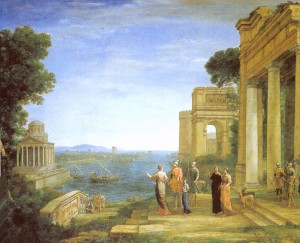 What is so noteworthy about this opening is that Carthage is not just any city, but Rome’s archenemy, its rival in three costly Punic Wars. Rather than vilifying Carthage, however, the city is held up as the goddess’s favored place: she had even chosen to keep her prized possessions there. Romans, on the other hand—“the offspring derived from Trojan blood”—were the conquerors who would despoil a goddess’s most sacred city. This passage does not just demote Rome as unimportant compared to Carthage; it vilifies Rome.
What is so noteworthy about this opening is that Carthage is not just any city, but Rome’s archenemy, its rival in three costly Punic Wars. Rather than vilifying Carthage, however, the city is held up as the goddess’s favored place: she had even chosen to keep her prized possessions there. Romans, on the other hand—“the offspring derived from Trojan blood”—were the conquerors who would despoil a goddess’s most sacred city. This passage does not just demote Rome as unimportant compared to Carthage; it vilifies Rome.
Later on, the epic narrows to discuss Augustus, his uncle Julius Caesar, and other contemporary Romans. Caesar’s bitter enemies are portrayed rather favorably, “though there were many who held it treason in that day to mention rebels with respect” (Frank 174). Cato the Younger is called “great Cato” and said to be worthy of praise; Caesar and his rival Pompey are named together as perpetrators of civil war, with no preference indicated between them (VI. 841; 829-832). When Aeneas hears a description of who had been thrown in Tartarus, pursuing civil war is listed among the top offenses that merit eternal hell—perhaps a subtle jab at Julius Caesar and Augustus, both of whom had waged costly civil wars.
These might be easy to overlook if, when the text finally got to Augustus, the praise were over-the-top. Yet this is not the case. Augustus is mentioned when Aeneas comes across his shade in the Underworld:
This is the man, this is him, whom you so often hear promised you, Augustus Caesar, son of a God, who will make a Golden Age again in the fields where Saturn once reigned, and extend the empire beyond the Libyans and the Indians… Even now the Caspian realms, and Maeotian earth, tremble at divine prophecies of his coming, and the restless mouths of the seven-branched Nile are troubled (VI. 91-100).
The beginning of the panegyric sounds good: Golden Age, extending the empire. But if extending the empire were so glorious, why does the text go on to say that the very earth and the life-giving Nile tremble at Augustus’s approach? The foundations of Roman society lay in agrarianism. In traditional mythology and augury, the earth was calm and productive when the world was at peace. When the earth “trembled,” troubling events were to come.
It is also noteworthy that Augustus is included as only one of a long line of Roman leaders, and is grouped with the kings of the Roman monarchy (Frank 176). Romans in the Republic held an entrenched public fear of monarchy, and Julius Caesar and Augustus were criticized for attempting to consolidate the power of a king (for Augustus, at least, these fears were quite well-founded). Thus, Augustus’s placement amongst kings in the epic plays off these fears and subtly rebukes him even amidst praise. Aeneas, too, is referred to as “king” many times—four just in Book One—underscoring this point (I. 38; 544; 553; 575-578).
All this textual evidence contradicts the message Donatus ascribes to the Aeneid. Not everything in the poem praises Aeneas, Augustus, or the Roman Empire. Much of it suggests the exact opposite, and it is precisely by rejecting any set “intent” beforehand that all these aspects reveal themselves. Otherwise, the poem flattens. In Donatus’s reading, Dido is portrayed as chaste and talented only so that she can be “good enough” for our hero. Turnus is brave and capable only so that defeating him becomes more impressive. The ending of the epic loses much of its depth and its connection to Anchises’s advice, reduced only to a parable of the value of loyalty: if someone kills and robs your friend, you should under no circumstances offer him mercy.
It is also important, however, to note that while many aspects of the text do criticize the Augustan regime, not all do. The depiction of Augustus on Aeneas’s shield in Book Eight is genuine praise (XIII. 671-731). Except for the few cases mentioned, Aeneas is brave, capable, and respectable, but there would be no exceptions if he were truly divine. Precisely by not allowing any set intent—whether praising Augustus or undermining him—to influence our reading, we can notice the layered, somewhat contradictory nature of the poem’s claims.
But, for argument’s sake, what do we know about Vergil’s actual intent? Could Donatus have been right that Vergil was aiming to praise Augustus, even if, as we’ve seen, he didn’t always do so? Or, as some modern scholars have suggested, could Vergil have been secretly subversive, a rebel fighting the injustice of empire with his pen, an apologist undermining his own propaganda?
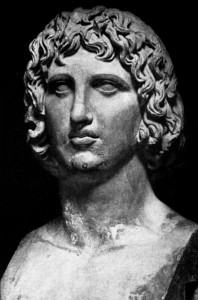 We know that Augustus and Vergil were fairly close acquaintances. We know that in Vergil’s Georgics, published ten years before the Aeneid, he had written, “Soon I’ll prepare myself to speak of [Augustus] Caesar’s fiery battles, and take his name forward, famous” (III. 47). We also know that Vergil was watching Augustus amass more and more power during those ten years. Conspiracy theorists point out that in 19 BCE, right after Vergil had finished his draft of the Aeneid, he took a trip to Greece, the place Roman authors went when they wanted to leave town for a while. On the way, he coincidentally ran into Augustus, and Vergil grew ill and died the next day. (Augustus loved to use poison to dispatch his enemies.) Vergil had asked in his will for the Aeneid to be burned: was this because he hadn’t put his finishing touches on the poem or because he could no longer bear to publish a work that would serve as propaganda?
We know that Augustus and Vergil were fairly close acquaintances. We know that in Vergil’s Georgics, published ten years before the Aeneid, he had written, “Soon I’ll prepare myself to speak of [Augustus] Caesar’s fiery battles, and take his name forward, famous” (III. 47). We also know that Vergil was watching Augustus amass more and more power during those ten years. Conspiracy theorists point out that in 19 BCE, right after Vergil had finished his draft of the Aeneid, he took a trip to Greece, the place Roman authors went when they wanted to leave town for a while. On the way, he coincidentally ran into Augustus, and Vergil grew ill and died the next day. (Augustus loved to use poison to dispatch his enemies.) Vergil had asked in his will for the Aeneid to be burned: was this because he hadn’t put his finishing touches on the poem or because he could no longer bear to publish a work that would serve as propaganda?
It is impossible to answer these questions with any degree of certainty. Yet fortunately, we need not know Vergil’s intentions to appreciate his epic. Even if we did know them, it would in no way smooth out the intricacy of messages in the Aeneid, some praising but many criticizing the Augustan regime—which, of course, is what makes the poem so realistic and so relevant. There are excellent characteristics of Aeneas’s leadership and there are situations in which he falls short. There are advantageous aspects of empire and there are oppressive aspects. Heroes are not always perfect; enemies are sometimes laudable. Reading through the lens of any specific intent does not allow for such complexity, and it just this multidimensionality that makes the Aeneid a masterpiece.
WORK CITED
Frank, Tenney. Vergil, a Biography. New York: Russell & Russell, 1965. (link)
Grant, Michael. Roman Literature. Cambridge: U, 1954. (link)
Starr, Raymond J. “An Epic of Praise: Tiberus Claudius Donatus and Vergil’s ‘Aeneid.’” Classical Antiquity, vol. 11, no. 1, 1992, pp. 159–174. (link)
Vergilius Maro, Publius. Aeneid. 19 BCE. (Translations used included www.poetryintranslation.com/PITBR/Latin/VirgilAeneidI.htm and http://vergilregit.blogspot.com/p/book-1-full-literal-translation.html, though some passages I modified to better reflect the literal Latin.)
